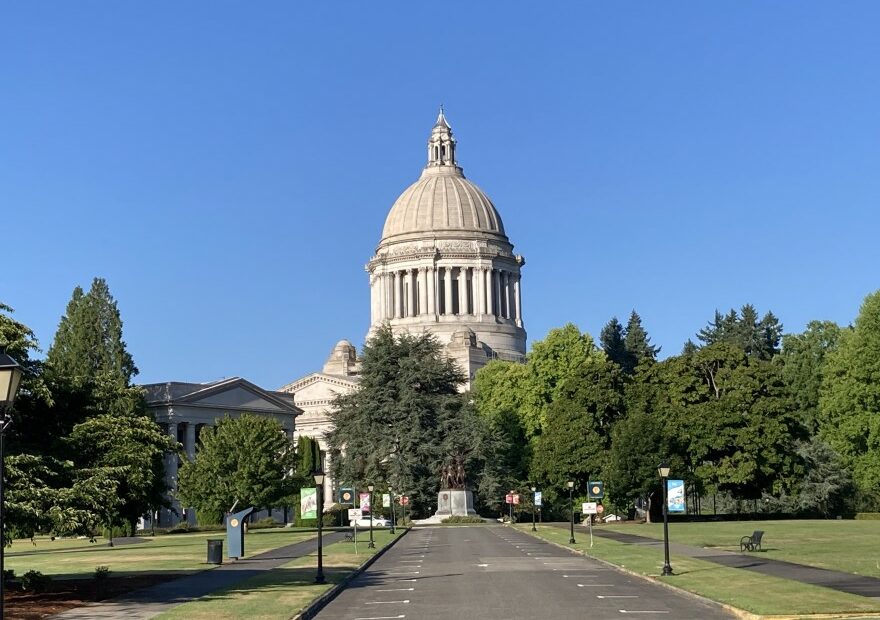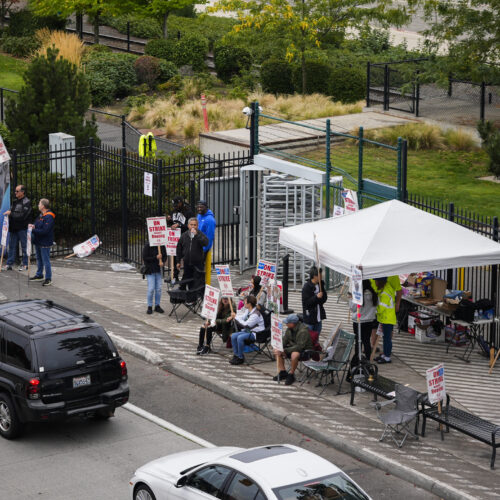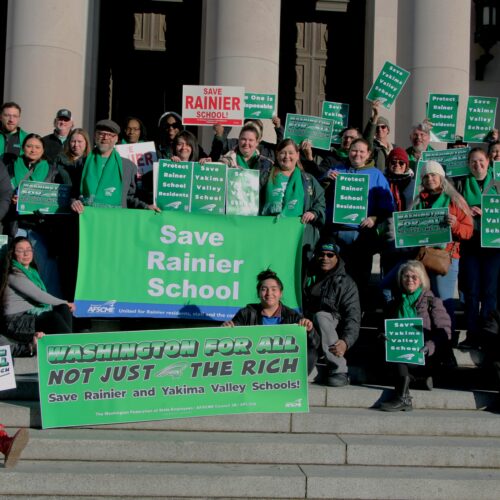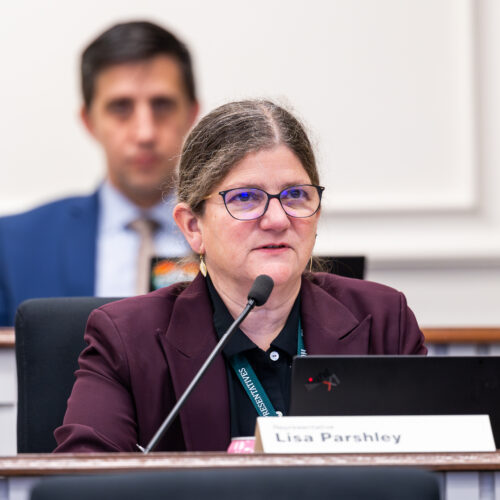On the afternoon of March 1, 2018, the Washington House took up a controversial bill to privatize the state’s unionized homecare workforce — the roughly 46,000 individual providers who help bathe, dress and feed elderly or disabled clients in their own homes.
The lengthy and fiery debate that unfolded on the House floor would serve as a prelude for what was to come in the years ahead as Democrats, once again, asserted one-party rule in Olympia and advanced legislation backed by the state’s powerful unions.
Typically, Democrats aren’t fans of privatization. But in 2018, they touted the homecare privatization legislation — which had been requested by the administration of Democratic Gov. Jay Inslee — as a way to outsource administrative functions that were taking away from client care.
“With this bill we are reducing the paperwork so that we can increase care,” said Democratic state Rep. Tana Senn.
But minority Republicans insisted the bill was about something else — doing an end-run around a 2014 U.S. Supreme Court decision that said homecare workers who are quasi-public employees can’t be compelled to pay union dues. In theory, if the workforce was privatized, the union that represents homecare workers — Service Employees International Union 775 — could negotiate a contract that required homecare workers to be members of the union and pay dues.
“This is nothing more than a payback to a union,” insisted then-state Rep. Joyce McDonald, a Republican. She was immediately gaveled down by the speaker for impugning the motives of the bill’s supporters.
The debate that day got so contentious that eventually House Republicans retreated to their caucus room. When the time came to vote on the bill, they refused to return to the floor. It was a rarely seen act of protest. But it didn’t stop the bill from passing. Democrats went ahead without Republicans and approved the measure 50 to 0. It had previously passed the state Senate.
Approving this union-backed bill in 2018 sent a message: Democrats were back in control in Olympia after several years of divided control. The previous November, with the help of union political contributions and organizing, Democrats had won a special election in a hotly contested race in the suburbs east of Lake Washington. With that victory, they had retaken the majority in the state Senate — by a single seat. Now, once again, Democrats had one-party control of Olympia.
At the conclusion of the 2018 session, the Washington State Labor Council (WSLC), the state’s largest labor organization, published a legislative wrap-up headlined “Proof that every vote counts.” It touted the passage of bills that had previously been bottled up under split control: equal pay, voting rights, prevailing wages and bargaining rights.
Unions make gains
In the years since, Democrats have grown their majorities in Olympia and continued to approve pro-union or union-backed legislation — some high profile, much of it well below the radar. The victories include more than 20 laws aimed at bolstering unions, expanding organizing or strengthening workplace protections.
“I think one of the things that we’re seeing is a real effort, a concerted effort to take advantage of the fact that the governor, the Senate and the House are all Democrats at the moment,” said Kim England, a University of Washington professor who directs the Harry Bridges Center for Labor Studies.
England notes that while nationally unions have waned, Washington ranks fifth in the nation for union membership fueled largely by the rise of public sector and service industry unions, like the Service Employees International Union (SEIU). Other influential unions include the Washington Federation of State Employees and the Washington Education Association, the state’s teachers union.
Besides the homecare worker bill, Democrats also passed a bill in 2018 that requires employers to give union representatives access to new hires. A year later, they approved a measure designed to strengthen the rights of workers through collective bargaining. And in 2020, they passed a union-backed bill that exempted certain public employee information, like birthdates, from public disclosure — information the conservative Freedom Foundation had been seeking as part of an effort to contact union members.
Majority Democrats have also enacted sweeping progressive tax and policy measures backed by unions. They include a first-in-the-nation state-run long-term care program in 2019 and, this year, a long-sought capital gains tax.
Some of the victories have been more indirect, but no less impactful. For instance, in 2018, Democrats closed out a decade-long school funding lawsuit by putting more money into K-12 education. That extra money, along with a tweak in state law, created what one union official at the time called a “once in a lifetime opportunity” for many public school teachers to secure double-digit pay raises from their local districts, which they did that summer and fall in a flurry of local bargaining sessions.
Political tug of war
While Democrats and their labor allies celebrate what they call “pro-worker policies,” minority Republicans say it adds up to unions — especially public sector unions — having too much political power in Olympia.
“I’m not in any way opposed to unions,” said Senate Republican leader John Braun of Centralia. “I just think, in particular in our state, you have the public sector unions who have outsized influence.”
Braun argues that public employee unions have a vested interest in the state spending more and taxing more, resulting in what he called a “harmful” imbalance.
Democrats offer a different view.
State Rep. Marcus Riccelli of Spokane represents two of the lowest-income census tracts in the state. He was also the prime sponsor of a 2019 bill that gave nurses guaranteed meal and rest breaks, something they had sought for a decade.
While acknowledging that unions hold sway in Olympia, he says the policies unions advocate for generally also help workers who aren’t union members.
“I do think that our labor unions are speaking with a broader voice for worker protections, worker safety, fair wages, fair benefits and have really been stepping up on economic justice and racial equity,” Riccelli said.
Union leaders also push back on the idea that they have outsized political clout in Washington. The state Labor Council says that to the extent that unions wield influence, it’s the result of organizing.
“We are effective because we are organizers. It’s what we do,” said WSLC president Larry Brown in a statement. He also noted that some labor-backed bills enjoy bipartisan support.
Brown added that unions don’t get everything they ask for, giving the example of a bill dubbed the Worker Protection Act which passed the Washington House, but died in the state Senate earlier this year. Fiercely opposed by businesses, it would allow workers and unions to file lawsuits against employers on behalf of a state agency — this is known as a qui tam action — in order to enforce labor laws and standards such as the state’s minimum wage and equal pay requirements.
Labor leaders also point to the influence of business interests — noting that nationally businesses outpace labor unions in political spending.
Campaign hardball
While policy priorities change from year to year, the symbiotic relationship between Democrats and unions is age-old, just as Republicans and business interests are closely aligned.
Each campaign cycle, Washington unions spend millions mostly in support of Democrats. Last year, four of the top 10 lobbying entities in Washington were unions, according to the state’s Public Disclosure Commission. Additionally, in 2020, five of the top 10 independent-expenditure committees — which spend separately from candidates — were union-sponsored or heavily funded by unions.
As Democrats have solidified their lock on the Legislature, unions also have flexed their political muscle more aggressively.
Last year, SEIU and other unions teamed to tried to defeat state Sen. Mark Mullet — a moderate, suburban Seattle Democrat they viewed as a barrier to progressive policies like a capital gains tax and state-run long-term care program. Even Gov. Jay Inslee endorsed Mullet’s more progressive Democratic opponent — a nurse and union member.
“It was a shot across the bow what they did in my race last year,” Mullet said.
Business interests rallied to Mullet’s support and he won the race by fewer than 60 votes after a recount. But he says a labor-backed effort, successful or not, to unseat a sitting Democrat has a chilling effect.
“Even though I won, they sent a very powerful message to other people not willing to vote for their policies that they will be willing to take them out,” Mullet said.
Adam Glickman of SEIU 775, the homecare worker union, which was involved in the race, disputed that characterization.
“It wasn’t like we were trying to make some broader point,” Glickman said. “We just decided that Senator Mullet was not representing our members’ interests.”
Whether it was a warning shot or a one-off, the fact that unions targeted Mullet for defeat demonstrates just how much has changed in four years.
Not so long ago, Mullet was viewed as a linchpin critical to helping Democrats wrest back control of the state Senate.
Now the battle lines have shifted and moderates like Mullet are suddenly expendable as some Washington unions angle to make the Legislature even more progressive.
This story was reported in collaboration with Joe O’Sullivan of The Seattle Times.
———————————————————————————————————
Union wins at the Washington Legislature
Since Democrats in 2018 consolidated control of the Legislature, they’ve passed a slew of bills sought by labor unions, who represent some of their biggest political allies. Some bills advanced worker protections, others strengthened unions’ ability to collect dues, and still more expanded union membership to new classes of state workers. Here’s a selection of laws passed:
Strengthening collective bargaining
HB 2751: Gave unions the right to deduct dues or fees from public employees unless they explicitly opt-out. Came in response to the U.S. Supreme Court decision Janus v. AFSCME that ruled public workers can’t be forced to pay union fees.
HB 1888: Removed certain state employee personal information from the Public Records Act. That information had been requested and used by the conservative Freedom Foundation to locate and contact union members to inform them they don’t have to pay dues.
SB 6229: Required employers to provide bargaining representatives reasonable access to new workers for at least 30 minutes to present information.
HB 1575: Among other things, required state employees to request in writing if they want to opt out of paying union dues. It also lowered the threshold for some workers seeking representation through the “cross-check” process, to just over 50%, rather than 70%.
Expanding worker protections
HB 1506: Strengthened the state’s Equal Pay Act by, among other things, adding language that restricts employers from depriving a worker of career opportunities on the basis of gender.
SB 5172: Phased in overtime pay rights for agricultural workers.
HB 1155: Established rest and meal breaks for nurses and frontline hospital caregivers.
SB 5021: Shielded public pensions from cuts in benefits due to furloughs or cuts in hours due to the COVID-19 pandemic.
HB 1206: Created health and safety standards for temporary workers in the manufacturing and construction industries.
HB 1097: Provides protections against retaliation for workers who come forward with workplace safety concerns.
Expanding worker pay or union membership
SB 5297: Expanded collective bargaining rights to assistant attorneys general at the state Attorney General’s Office.
HB 2017: Expanded collective bargaining to administrative law judges.
SB 5133: Expanded collective bargaining rights to certain employees who work with assistant attorneys general in the torts division.
SB 6230: Expanded collective bargaining rights to professional employees of port districts.
SB 5493: Established rates for prevailing wages based on collective bargaining agreements or other methods if no agreements are available.
SB 6217: Ended a loophole that allowed some employees at Seattle-Tacoma International Airport to be paid less than the minimum wage set by the city of SeaTac.




















